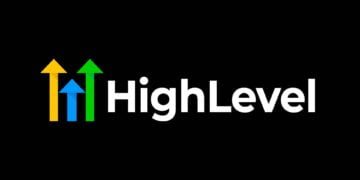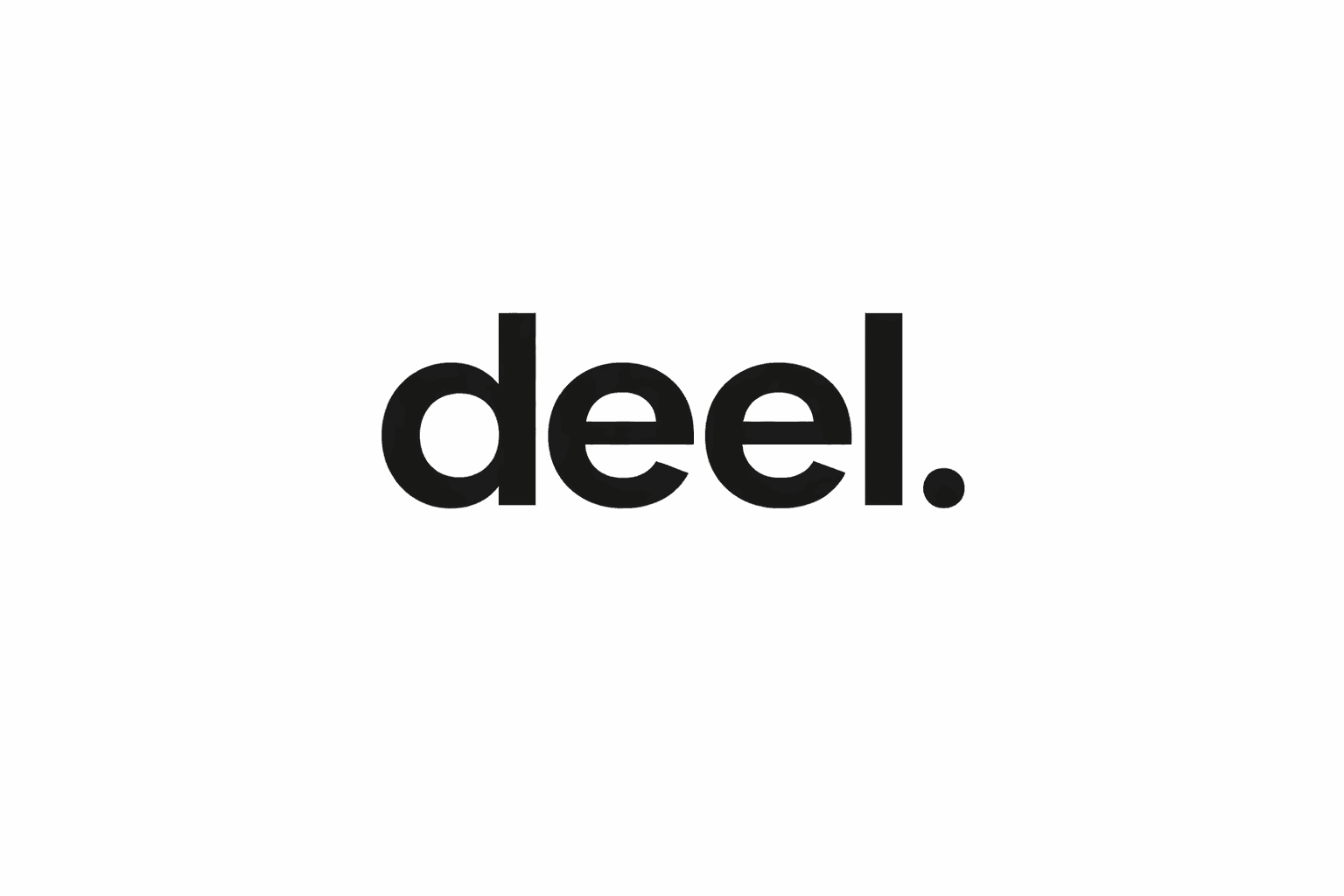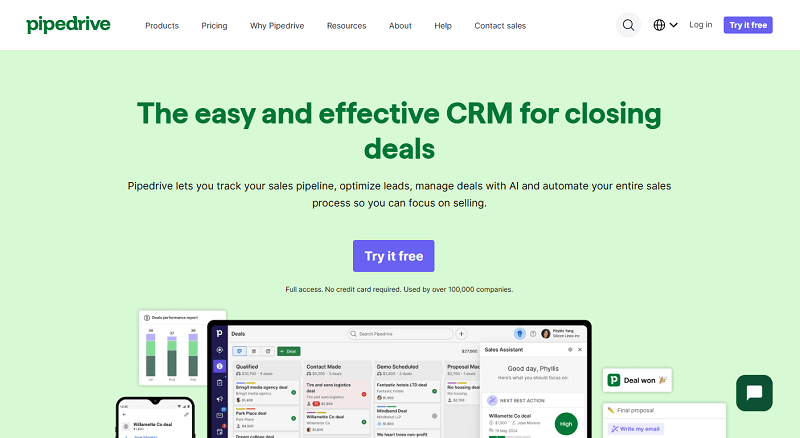In today’s wildly competitive fashion industry, cultivating relationships with clients is more important than ever. Your customers don’t always come back to buy clothes. Often, the connection is more than just a sale. The experience created during and after their purchase brings them back.
Fashion is about dreaming and making other people dream. — Donatella Versace.
However, a good customer relationship management tool can turn first-time customers into loyal customers. That means, for an industry driven by trends, a CRM for fashion brands works wonders.
In this blog post, we’ve curated the best CRM for fashion brands and how it can help your business thrive in the fashion market.
Table of Contents
What is a CRM for Fashion Brands?
A CRM for a fashion brand is special software. It helps manage and improve how a brand interacts with current and potential customers. It organizes, automates, and synchronizes key operations such as sales, marketing campaigns, customer service, and technical support.
In the fashion industry, a CRM does more than just manage customers. It helps make processes smoother from design and production to retail and online sales. It empowers fashion brands to understand customer preferences, track buying behaviors deeply, predict market trends, personalize experiences, and boost customer satisfaction and loyalty.
Furthermore, by integrating real-time data, segmentation, and targeted communication, a fashion CRM strengthens brand identity and enhances customer retention.
Why Every Clothing Industry Needs CRM Software
- Enhanced Customer Loyalty and Personalization:
A CRM system helps fashion, textile, and clothing brands understand what customers like. With these insights, brands can offer tailored incentives, personalized communication, and loyalty rewards that strengthen customer satisfaction and retention.
Zara uses customer data to give loyal shoppers exclusive previews of new collections. They also provide unique recommendations and early access to special promotions.
This focused engagement keeps customers closely linked to the brand. This makes CRM technology an important tool for success in the fashion industry.
- Better Customer Experiences:
With numerous fashion brands competing in the market, delivering an outstanding customer experience has become crucial for standing out.
With a CRM system, fashion brands can design products, create personalized promotions, to meet individual customer needs and preferences. This level of customization fosters stronger brand loyalty and long-term customer engagement.
- Enhanced Revenue Generation:
Fashion firms are more likely to see increased engagement and conversion rates when they employ CRM systems. It provide customized product recommendations, targeted marketing, and personalized offers.
The best CRM for fashion brands promote your business through enhanced marketing tactics by studying customer data. These actions all directly contribute to higher revenue and more robust business growth.
- Stronger customer relationships:
Building solid, long-lasting relationships with your clients is a major reason fashion firms spend money on CRM technologies. So, a CRM systems gives businesses the ability to use email marketing to create loyalty programs, and provide special perks based on customer preferences.
Customers feel appreciated and valued as a result of these tailored interactions, which promote recurring business
- Improving Inventory Management:
CRM software is essential for improving inventory choices. It helps fashion firms limit inventory for slower-moving items by evaluating customer data and watching purchasing trends.
Key features of a CRM for Fashion Brand
- Customer Segmentation:
One key feature a CRM for fashion should have is customer segmentation. With this, clients can be grouped based on style preferences and purchase patterns.
Every customer will receive pertinent offers and communications thanks to this targeted strategy, which improves customer satisfaction, fosters greater loyalty, and boosts revenue.
- Multiple Channel Assistance
A CRM should have a multi-channel assistance feature for fashion firms, it helps firms oversee consumer interactions from a single dashboard across several platforms.
The CRM gathers and synchronizes data, whether a consumer interacts with the business through Instagram, an online store, or an in-store visit, guaranteeing consistency and increasing customer happiness.
- Automation in Marketing
Textile companies that want to expand their client base easily should have marketing automation as a CRM function. it enables firms to automate advertising alerts, post-purchase follow-ups, customized email campaigns, and SMS marketing.
- Analytics and Reporting
Making data-driven decisions in the fashion sector requires the use of analytics and reporting.
CRM systems provide comprehensive visual reporting on key performance indicators (KPIs) such as average basket size, campaign performance, return rates, customer acquisition expenses, and customer lifetime value.
Through better customer segmentation, marketing strategy optimization, and understanding what works, these insights help organizations achieve long-term, profitable growth.
- Monitoring and Forecasting Sales
A CRM system’s sales tracking and forecasting features assist fashion firms in keeping an eye on the complete sales funnel, from the first lead generation to the last transaction.
Through the use of AI-powered analytics, brands can better allocate resources, discover purchase patterns, determine which goods are doing best, and forecast future sales trends. Precise forecasting enables brands to predict demand, efficiently organize promotions, and optimize revenue expansion.
- Programs for Loyalty and Retargeting
Brands might give devoted customers unique birthday offers, early access to new collections, or exclusive discounts.
Furthermore, by examining past purchases, brands can use customized emails, SMS, or advertisements to retarget consumers who expressed interest but did not finish a transaction, increasing lifetime value and retention.
Best CRM FOR Fashion Brands
- Capsule: Overall best in Customer Service
- Salesforce: Best in Customization
- Hubspot: Best in free support
- Monday.com: Best in project management
- Freshsales: Best in streamlined sales process
- Pipedrive: Best in pipeline management
- NetSuite: Best in integration
1. Capsule—Overall best in customer service
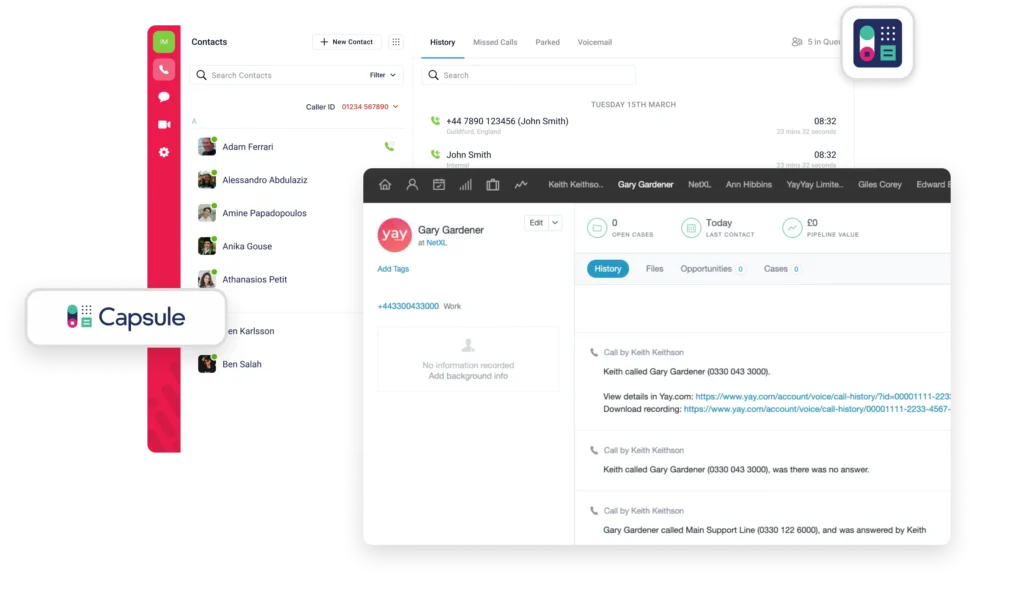
Capsule is a flexible and affordable tool for managing customer relationships. It helps companies grow in marketing, sales, and customer service. Capsule offers many important features.
These include project visualization, sales pipeline tracking, and contact management. You can access all these through an easy-to-use interface.
With real-time updates and live reporting, users can manage leads and complete customer journeys. This helps improve performance forecasting for ongoing projects.
Capsule CRM provides fashion companies with a strong and easy-to-use platform. It helps manage customer information and sort audiences by buying habits. The platform also automates marketing campaigns tailored for different clients.
Features of Capsule CRM
- Tools for Automation
Capsule CRM’s robust automation features help you optimize project management and sales procedures. It lets you easily handle follow-up correspondence, automate repetitive operations, and launch focused marketing automation campaigns.
This speeds up the sales cycle by saving your team a significant amount of time and guaranteeing that leads and clients receive prompt, individualized attention.
- Managing Contacts
Capsule’s powerful contact management tools make managing client relationships simple. By providing full-text search, auto-enriched profiles, and orderly record-keeping, Capsule improves consumer insights.
More individualized interaction and improved relationship-building result from businesses’ ability to quickly access comprehensive client histories, tag contacts, and keep an updated database.
- Email Resources
Capsule CRM’s efficiency-focused solutions make email communication easier. Users can manage customer communications via a centralized shared inbox, send emails straight from the CRM platform, and build standard email templates. This guarantees a smooth customer support experience by keeping all team members informed, cutting down on duplication, and speeding up response times.
- Protection and Authorization
When it comes to Capsule CRM, security is paramount. Single Sign-On (SSO) connectivity via Google Workspace and Microsoft 365 for easier access, two-factor authentication to safeguard user accounts, and complete GDPR compliance with safe data export features are all features it provides. These features offer regulatory compliance and peace of mind, which is crucial for companies that handle sensitive client data.
- Connectivity and Integrations
With Capsule CRM’s superior connectivity features, connecting with your current business tools is simple. The capsule may be easily integrated with well-known programs like Microsoft Outlook, Xero, QuickBooks, Google Workspace, and Mailchimp to centralize your operations.
The Capsule mobile app ensures rapid access to customer data while on the go, keeping your staff engaged and productive from any location. You can also automatically gather leads into your CRM with online form connections, which will help you increase the efficiency of lead handling and optimize your sales funnel.
- Customization
With Capsule CRM’s adaptable customization capabilities, you may modify the platform to meet your company’s particular requirements.
Additionally, Capsule offers customizable layouts and a bespoke mail dropbox, allowing companies to express their brand identity within the CRM.
This degree of customization makes sure that your CRM system works with your business, not the other way around, which makes managing customers and sales easier and more effective.
Pros and Cons
Pros
- Mobile app
- Customizable fields
- Sales analytics
- Document storage
- AI content assistant
Cons
- Limited customization
- Integration limitation
- Limited reporting option
2 Salesforce: Best in Customization
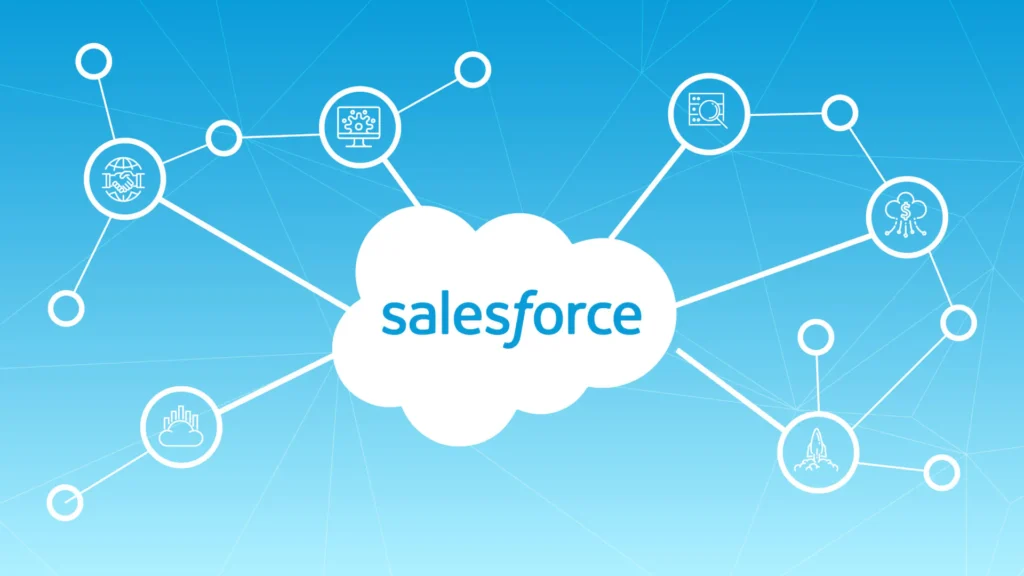
Salesforce is a leading American cloud-based software company specializing in customer relationship management (CRM) solutions. Widely recognized around the world, Salesforce provides tools that help businesses find more prospects, close more deals, and deliver exceptional service to their customers.
Its CRM platform is a cornerstone for many sales, support, and marketing teams, offering an integrated suite of services that streamline customer engagement and business processes.
By leveraging cloud technology, Salesforce enables companies to connect more effectively with their partners, clients, and prospects. It allows organizations to track customer interactions, manage marketing campaigns, automate workflows, and analyze data, all in real time. Salesforce’s robust suite of services helps businesses create personalized customer journeys, enhance customer support experiences, and foster long-term customer loyalty.
A CRM platform like Salesforce does much more than manage contacts. It helps businesses dive deeper into their data and metrics, offering customizable dashboards and comprehensive reporting tools for clear, visual insights. Automation features support personalized outreach, ensuring communications are timely and relevant. Additionally, Salesforce empowers sales and service teams by improving efficiency, increasing customer satisfaction, and ultimately driving business growth.
With its flexible, scalable architecture, Salesforce CRM adapts to businesses of all sizes and industries, making it one of the most powerful and popular CRM solutions in the market today.
Features of Salesforce
- Reports and Dashboard
Salesforce’s dashboards and reports provide fashion firms with configurable, real-time insights into customer behavior, marketing, sales, and inventory. Monitor important indicators in a single view, such as omnichannel performance, return trends, campaign ROI, and sell-through rates.
Advanced reporting enables you to integrate information from inventory, retail point-of-sale, and eCommerce systems for more thorough analysis, which aids in trend prediction, stock optimization, and customer experience personalization.
Make data-driven decisions across all channels of sales and collection to stay ahead of the curve.
- Contact Management
Salesforce’s contact management gives you a complete view of each customer, including their activity history, key contacts, communication logs, and social media insights.
It supports personalized engagement by helping teams access detailed customer profiles and enables better collaboration across departments. With mobile access, teams can stay connected and informed from anywhere.
- Opportunity Management
Opportunity management in Salesforce helps streamline the sales process by keeping all sales-related data in one place. It allows you to track key customer interactions, prioritize high-value opportunities, and generate quotes instantly. With tools for forecasting and pipeline visibility, your team can focus on closing deals faster and more efficiently.
- Process Automation
Salesforce simplifies business processes with point-and-click automation tools. You can design and manage workflows using drag-and-drop functionality, automate approvals and routine tasks, and connect operations across teams using Process Builder and Flow. This ensures greater consistency, reduces manual effort, and scales with your business needs.
Pros and cons
Pros
- Seamless integration and scalability
- Mobile Accessibility
- Customization
- Compliance and data security
Cons
- Steep learning curve
- High cost
- Limited mobile app functionality
3. Hubspot: Best in Free Support
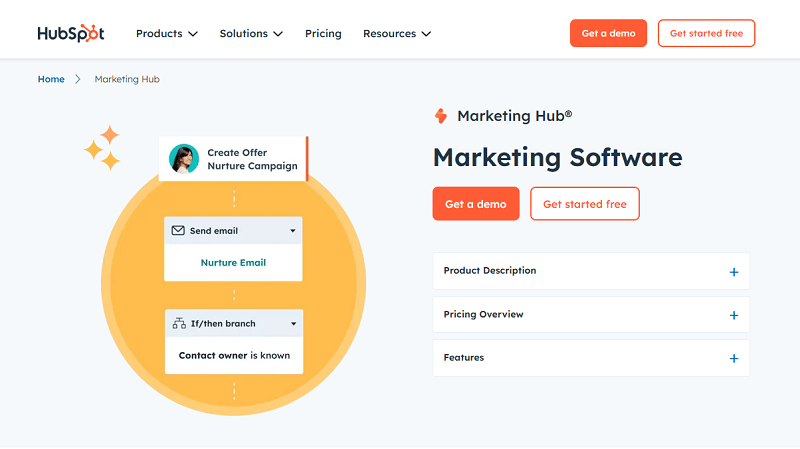
HubSpot CRM is a robust customer platform driven by artificial intelligence that integrates website management, operations, sales, marketing, and service into a single, cohesive solution. HubSpot assists companies in attracting leads, engaging prospects, and satisfying customers. It ensures that your entire team is informed and in sync, unlike using different tools for each function.
Your team can concentrate on establishing connections and closing business since the platform automates crucial processes like pipeline management, email monitoring, follow-ups, and reporting. Smart dashboards and customizable reports give you complete insight into the campaigns, sales initiatives, and customer service processes that are successful.
Whether you’re aiming to generate more leads, increase conversions, or retain loyal customers, HubSpot CRM provides the tools and scalability to grow your business efficientl
features of Hubspot
- CRM Database
HubSpot allows you to store all customer and prospect data in a centralized CRM database ideal for managing customer profiles, purchase history, and preferences.
Fashion businesses can save up to 1,000,000 contacts with no time limits, helping you avoid manual entry and messy spreadsheets and easily access customer info for targeted promotions and outreach.
- Customized Dashboard
With HubSpot’s customizable dashboards, fashion retailers can track vital metrics like seasonal sales trends, campaign performance, average order value, and return customer rates. You can personalize widgets and filters to focus on KPIs that matter most to your brand, such as product performance, conversion rates, and customer retention.
- Integration with Other Tools
HubSpot integrates with popular tools such as Gmail, Shopify, WooCommerce, and more giving fashion brands access to free productivity tools like templates, scheduling, email tracking, and centralized data syncing. This enhances efficiency, streamlines order and inventory tracking, and improves overall customer experience.
- Reporting and Analytics
The platform makes it easy to generate detailed reports that help forecast sales and analyze marketing campaign performance. You can quickly identify which styles, collections, or channels are driving the most engagement, allowing you to make data-driven decisions to boost revenue.
Pros and Cons
Pros
- A free basic plan with robust features
- Easy to use, even for non-technical users
- Excellent marketing automation for campaigns and customer journeys
- 24/7 customer support for paid plans
Cons
- Advanced features require upgrading to a paid plan
- Limited customization compared to some specialized CRMs
- No live support for free-tier users
4. Monday.com - Best in Project Management
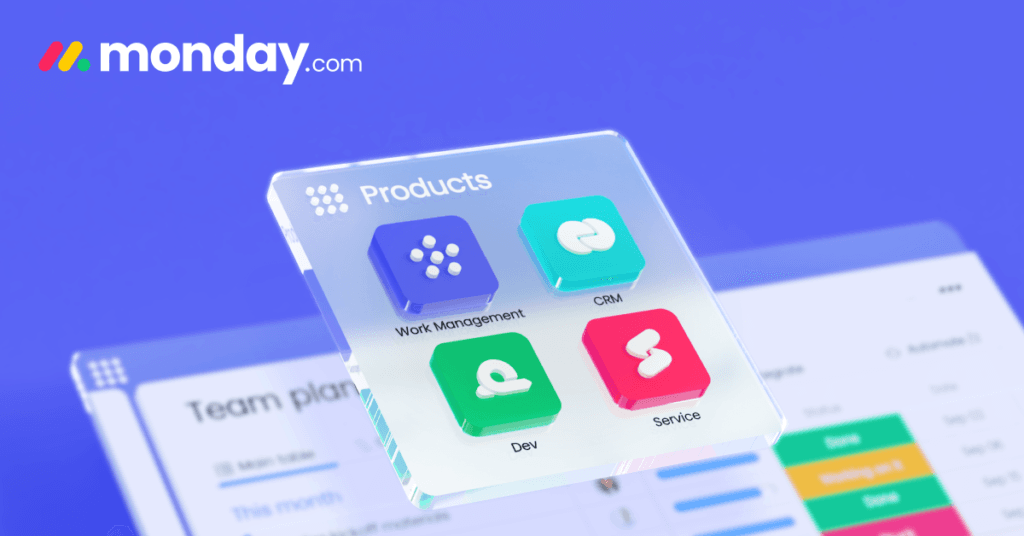
Monday.com is a robust cloud-based work and project management tool that makes teamwork, project tracking, and everyday activities easier. Monday.com is renowned for its easy-to-use interface, intuitive design, and highly visual dashboards. It is particularly useful for fast-paced industries like fashion since it helps teams stay coordinated, productive, and on time.
features of Monday.com
- Data Visualization & Dashboards:
Monday.com provides strong, adaptable dashboards that transform complicated data into understandable, useful images. In one location, users can monitor task distribution, project statuses, and KPIs.
- Time Tracking Note
Users can manually or automatically record the amount of time spent on particular tasks using the integrated time-tracking tool. This increases overall productivity, resource allocation, and planning accuracy.
- CRM, or lead management
Teams can use Monday.com’s CRM system to automate follow-ups, manage leads along the sales funnel, and use lead scoring to rank high-value opportunities. All customer interactions are visible to sales teams in one location.
- Customer service and educational materials
The platform offers email and a built-in contact form with screenshot and video-sharing capabilities for round-the-clock customer service. Live webinars, a YouTube channel, discussion boards, and detailed instructions are some more options.
- Integrations with more than 100 apps
Monday.com easily connects with several well-known programs, such as Google Drive, Zoom, Microsoft Teams, Slack, Trello, and more. Support for Zapier enables sophisticated platform automation.
- Graphic Project Boards
With drag-and-drop boards, users may manage workflows from a variety of perspectives, such as Timeline, Calendar, Gantt, and Kanban. As a result, project tracking becomes easier to use and more cooperative.
Pros and Cons
Pros
- Intuitive, visually appealing interface
- Highly customizable project views and styles
- Robust integrations for automation and data syncing
- Comprehensive support resources and tutorials
- Calendar syncing and smart deadline tracking
Cons
- limited HIPAA compliance options for smaller teams or use cases
- Formula functionality could be more flexible for sorting and filtering
- Conversations, video clips, and wikis are stored separately from core project boards
5. Freshsales - best in Streamlined Sales
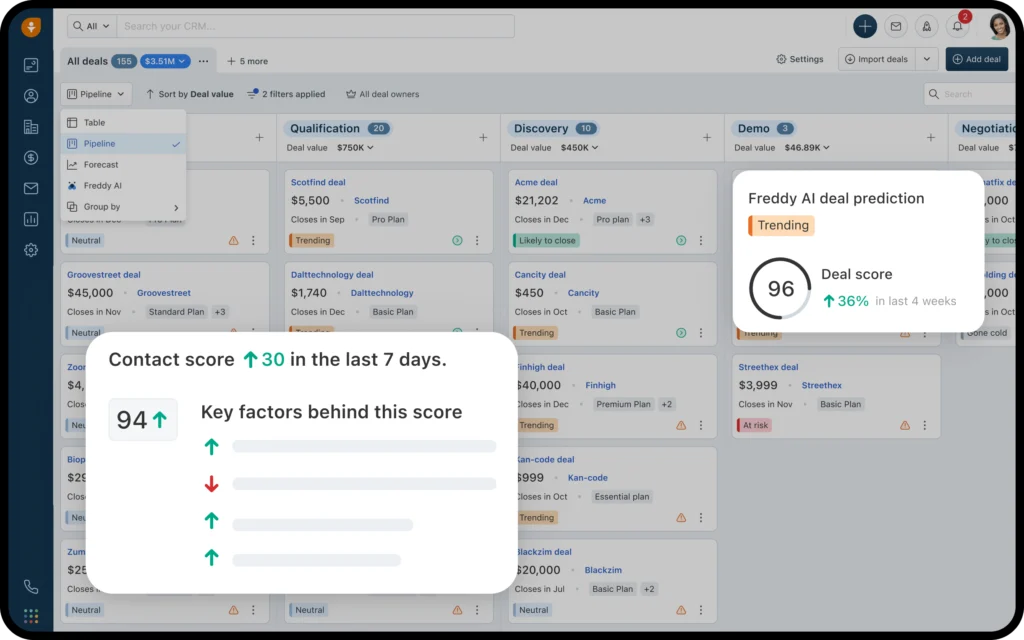
Freshsales is a CRM solution that is particularly noteworthy in the retail sector. It provides a comprehensive suite of tools that are specifically designed to improve the purchasing experience, increase sales productivity, and manage customer relationships.
Freshsales, which was developed with efficiency in mind, assists merchants in automating tedious processes like email campaigns and follow-ups so that teams can concentrate on interactions that have a significant impact. By identifying clients with more buy intent, its AI-powered lead scoring makes every touchpoint more significant and allows for wiser prioritizing.
Features of Freshsales
- Management of Contacts
Fashion manufacturers can organize vendor and client information in one location with Freshsales’ robust contact management solution. All contact information, including notes, social media profiles, and conversation histories, is simple to access and update, regardless of whether you’re working with retail customers, fashion influencers, or devoted internet consumers.
- Overseeing and Rating
Fashion firms can quickly collect leads from their Instagram campaigns, pop-up events, trade exhibitions, and eCommerce websites using Freshsales. This software assists sales teams in setting priorities by using AI to rate prospects according to buy intent.
- Tracking Events
Learn how customers use the product pages, digital lookbooks, and website for your fashion brand. Keep tabs on critical actions, downloads, and visits to learn more about customer preferences and product interests.
- Reports & Analytics
Fashion sales teams can access real-time statistics on campaign ROI, sales trends, team activity, and product performance with the help of Freshsales’ sophisticated analytics. Make your dashboards monitor KPIs by sales channel, region, or collection.
Pros and cons
Pros
- Omnichannel support
- AI-powered contact scoring for smarter lead prioritization
- Strong customer relationship management features with a user-friendly interface.
- Cons
- Occasional data mismatches in reports or integrations
- Limited feature access during the free trial period
Pipedrive - Best in Pipeline management

Pipedrive is a user-friendly CRM that helps you manage sales-related tasks. Its ability to simplify many customer interactions helps fashion businesses a lot. It tracks each lead, follow-up, and transaction stage easily.
Sales teams can swiftly pinpoint bottlenecks and close more offers by using its drag-and-drop pipeline, which ensures that they do not lose any opportunities.
Additionally, Pipedrive easily interfaces with marketing tools, enabling fashion firms to automate consumer outreach, personalize communications, and make data-driven decisions.
Features of Pipedrive
- Manager of Leads and Deals
Pipedrive lets you create a systematic sales funnel for each lead you gather from various sources, such as your website, social media, live chat, or even walk-ins.
- Task and Activity Organization
Use automated reminders to plan follow-ups, appointments, calls, or fittings. Nothing is overlooked because everything is connected to contacts or deals.
- Connecting & Monitoring Email
Pipedrive has direct connections to Outlook and Gmail. Emails can be sent from within the CRM, and lets you see when the client opens them. Extremely useful for determining without guessing who is interested in a lookbook or promo.
- Personalized Reports and Dashboards
Pipedrive’s reporting dashboard is clear and practical. You can get information on what’s selling, the number of deals you’ve closed per month, or the top-performing representative.
Pros and cons
Pros
- Time-saving tool
- Low-cost AI-integrated features
- Proposal generation capabilities
Cons
- A bit expensive
- No workflow automation in basic plans.
7. Nesuite - Best in Integration
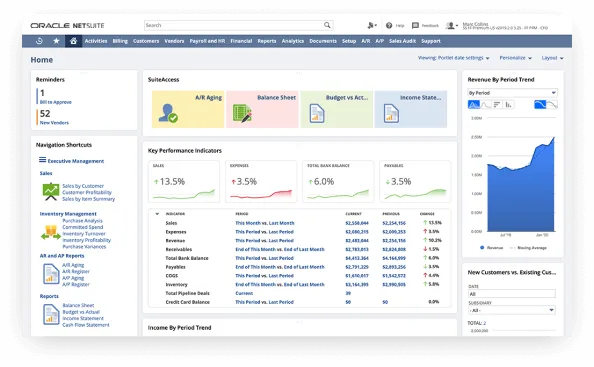
NetSuite’s Customer Relationship Management (CRM) system offers a single platform for managing interactions. It helps you connect with prospects, customers, partners, and suppliers.
From lead generation to managing opportunities, sales, and order fulfillment, this CRM helps with every step. It supports renewals, upsells, cross-sells, and ongoing support.
This system ensures a smooth flow of information throughout the customer lifecycle. It allows teams to boost engagement, speed up conversions, and build lasting customer relationships.
Features of Nesuite
- Unified Business View
NetSuite offers a complete business management system. It combines finance, supply chain, manufacturing, human resources, and e-commerce into one platform.
This reduces the inefficiencies of fragmented software and provides users with a single point of access for real-time monitoring of operations, performance analysis, and departmental alignment.
- Native integrations.
Unlike platforms that rely on third-party connectors, NetSuite’s apps are designed to interface with a central database. This offers continuous data synchronization, real-time visibility, and a uniform user experience.
- Automation Tools
Capsule CRM simplifies both sales and project workflows through intuitive automation features. You can automate follow-ups, task assignments, and marketing campaigns, ensuring timely communication and efficient pipeline management without manual effort.
- Contact Management
With Capsule’s advanced contact management system, users benefit from full-text search, auto-enriched profiles, and clean, organized record-keeping. These features make it easy to access customer histories, segment audiences, and build stronger, data-informed relationships.
- Email Tools
Streamline communication using Capsule’s built-in CRM email tools. Create and reuse branded templates, send emails directly from the platform, and manage all conversations through a shared inbox. It ensures consistent and efficient customer communication across your team.
- Deep Reporting & Real-Time Dashboards
With data coming into one central place, NetSuite’s reporting tools give useful insights. You can customize dashboards based on roles.
Executives, managers, and frontline staff can all access relevant KPIs, enabling informed, agile decision-making based on up-to-date information.
Pros and cons
Pros
- Unified platform with ERP integration
- Real-time customer and sales data
- Highly customizable
- Automation of sales and marketing processes
- Scalable for growing businesses
- Cloud-based accessibility
Cons
- High licensing and implementation costs
- Complex setup process
- Steep learning curve
Challenges faced in the fast fashion industry without CRM
1. Rapidly Changing Trends
Preferences in fashion shift faster than ever before, influenced by social media, micro-trends, and cultural movements. This volatility makes demand forecasting difficult and increases the risk of producing items that quickly go out of style, resulting in wasted inventory and lost revenue.
2. Consumer Distrust
Modern clients are highly informed and expect transparency. Brands that cut corners, whether in product quality, ethical sourcing, or sustainability claims, risk permanent damage to their reputation.
For instance, switching from premium materials like Riri zippers to cheaper alternatives such as YKK can erode trust, even if the difference seems minor. According to Sentiment, only 20% of surveyed consumers believe what brands say about sustainability, highlighting a significant credibility gap.
3. Talent Shortage
Despite economic pressures, the industry faces a serious labor gap. In the textile sector alone, there’s an estimated 20% labor shortfall.
This shortage is partly because many brands have moved jobs overseas for years. Now, they are trying to bring jobs back to meet consumer demands for fair labor practices.
Recruiting and retaining skilled talent across design, manufacturing, and retail remains a critical challenge.
4. Sustainability Pressures
The fashion industry accounts for around 10% of global greenhouse gas emissions. Fast fashion, synthetic materials, and overproduction contribute to this crisis.
Consumers increasingly demand ethical sourcing, transparency, and sustainable practices, not just lip service. Blockchain technology and verifiable sourcing are becoming essential for brands wanting to prove their environmental and social commitments.
5. Textile Waste and Environmental Impact
Between 2000 and 2020, global clothing production doubled. Yet 85% of all textiles still end up in landfills. Synthetic fabrics like polyester and nylon take centuries to decompose and shed microplastics during washing.
Simple design changes, like better cutting patterns, can greatly reduce waste. However, the industry is slow to adopt these changes.
7. Supply Chain Disruptions
COVID-19, trade wars, and international tensions have revealed the fragility of global supply chains. About half of the clothing and shoe imports in the U.S. come from China and Vietnam.
These areas face both logistical and ethical issues. Brands are now re-evaluating sourcing strategies to balance labor availability, environmental compliance, and geopolitical stability.
8. High Return Rates
As e-commerce grows, returns are also increasing. This often happens because of sizing issues. In this trend, consumers order multiple sizes and return most of them. Some fashion retailers have return rates as high as 25%.
This disrupts inventory flow, raises carbon emissions, and lowers profit margins. Virtual try-ons, accurate size recommendation tools, and limited free return policies are emerging solutions.
Conclusion
Choosing the right CRM for a fashion brand is an important decision. It can greatly affect how well your brand attracts, engages, and keeps customers.
Capsule CRM is the best choice for fashion companies, especially small to mid-sized ones. It offers a good mix of affordability, functionality, and simplicity. This is true even with many strong competitors in the market.
However, solutions like Salesforce, HubSpot, Pipedrive, and Zoho offer unique benefits based on a brand’s size and strategy. The goal is the same: to build strong customer relationships, improve operations, and stay ahead in a changing market.







